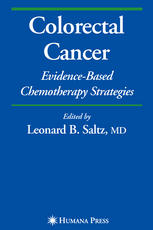

Most ebook files are in PDF format, so you can easily read them using various software such as Foxit Reader or directly on the Google Chrome browser.
Some ebook files are released by publishers in other formats such as .awz, .mobi, .epub, .fb2, etc. You may need to install specific software to read these formats on mobile/PC, such as Calibre.
Please read the tutorial at this link: https://ebookbell.com/faq
We offer FREE conversion to the popular formats you request; however, this may take some time. Therefore, right after payment, please email us, and we will try to provide the service as quickly as possible.
For some exceptional file formats or broken links (if any), please refrain from opening any disputes. Instead, email us first, and we will try to assist within a maximum of 6 hours.
EbookBell Team

4.0
56 reviewsManagement options for patients with colorectal cancer have undergone d- matic changes over the past decade. Whereas at the start of 1996 only one drug, 5-Fluorouracil, was available for the treatment of this disease, a mere 10 yr later, six drugs are licensed for use in colorectal cancer, and others are in the late phases of clinical development. Likewise, surgical and ablative options, as well as an array of supportive medications, have shown substantial progress and undergone a dramatic proliferation over the past decade. With the increased number of therapeutic options from which to choose, the clinician is better able to offer effective therapy to the patient with colorectal cancer. The clinician is challenged, however, to keep up with the rapidly changing landscape and the rapidly emerging data that shape the options for treatment today and tom- row. In this text, leaders in the management of colorectal cancer review the current literature that has led us to where we are today. Critical evaluations of the data are offered, and evidence-based recommendations are made.